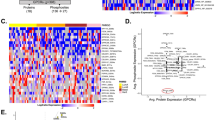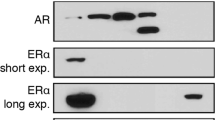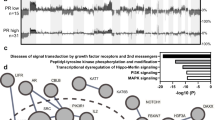Abstract
Four human cell lines derived from malignant gliomas were immunohistochemically examined for their content of estramustine-binding protein (EMBP). EMBP was detected in a large amount in all glioma cells during the entire cell cycle. EMBP has previously been demonstrated to be the major receptor protein in prostatic cancers for the cytostatic drug estramustine-phosphate (EMP). EMP caused a dose-dependent inhibition of exponentially growing cells by increasing the number of cells in G2/M stage of the cell cycle as monitored by flow cytofluorometry. The effect may be coupled to arrest of the glioma cells at metaphase. The presence of EMBP may suggest a selective binding and effect of EMP in glioma cells.
This is a preview of subscription content, access via your institution
Access options
Subscribe to this journal
Receive 24 print issues and online access
$259.00 per year
only $10.79 per issue
Buy this article
- Purchase on Springer Link
- Instant access to full article PDF
Prices may be subject to local taxes which are calculated during checkout
Similar content being viewed by others
Author information
Authors and Affiliations
Rights and permissions
About this article
Cite this article
von Schoultz, E., Lundblad, D., Bergh, J. et al. Estramustine binding protein and anti-proliferative effect of estramustine in human glioma cell lines. Br J Cancer 58, 326–329 (1988). https://doi.org/10.1038/bjc.1988.212
Issue Date:
DOI: https://doi.org/10.1038/bjc.1988.212
This article is cited by
-
High-grade astrocytoma treated concomitantly with estramustine and radiotherapy
Journal of Neuro-Oncology (2006)
-
Effects of radiotherapy and estramustine on the microvasculature in malignant glioma
British Journal of Cancer (1999)
-
Targeting microtubule-associated proteins in glioblastoma: A new strategy for selective therapy
Annals of Surgical Oncology (1996)
-
Radiosensitizing effect of estramustine in malignant gliomain vitro andin vivo
Journal of Neuro-Oncology (1995)
-
Expression of estramustine-binding protein in ependymomas and in human and developing rat ependymal cells
Journal of Neuro-Oncology (1994)



